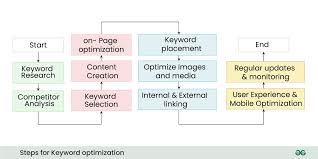The Art of SEO Keyword Selection
SEO keyword selection is a critical component of any successful digital marketing strategy. Choosing the right keywords can significantly impact your website’s visibility and ranking on search engine results pages.
When selecting keywords for your SEO campaign, it’s essential to consider both relevance and search volume. Relevance ensures that your content aligns with what users are searching for, while search volume indicates how popular a particular keyword is.
Long-tail keywords, which are longer and more specific phrases, can be particularly effective in targeting niche audiences and driving qualified traffic to your website. While short-tail keywords may have higher search volumes, they often face stiff competition.
It’s also crucial to conduct thorough keyword research to identify the terms and phrases that your target audience is using to find products or services similar to yours. Tools like Google Keyword Planner, SEMrush, and Ahrefs can provide valuable insights into search trends and competition levels.
Once you’ve identified relevant keywords, strategically integrate them into your website’s content, including meta tags, headings, body text, and image alt text. Avoid keyword stuffing, as this can harm your site’s ranking and readability.
Regularly monitor the performance of your chosen keywords using analytics tools to track their effectiveness and make adjustments as needed. SEO is an ongoing process that requires constant optimization to stay ahead of the competition.
In conclusion, SEO keyword selection is both an art and a science that requires careful consideration and continuous refinement. By choosing the right keywords and optimizing your content effectively, you can improve your website’s visibility, attract more organic traffic, and ultimately drive business growth.
5 Essential Tips for Effective SEO Keyword Selection: Targeting the Right Terms for Search Success
- Understand your target audience and their search behavior.
- Conduct keyword research using tools like Google Keyword Planner or SEMrush.
- Focus on long-tail keywords for more specific and targeted traffic.
- Consider the competition level and search volume of keywords before finalizing them.
- Regularly monitor and update your keyword strategy based on performance metrics.
Understand your target audience and their search behavior.
Understanding your target audience and their search behavior is paramount in effective SEO keyword selection. By gaining insight into the specific terms and phrases your audience uses when searching for products or services like yours, you can tailor your keyword strategy to align with their preferences. This approach not only increases the relevance of your content but also enhances the likelihood of attracting qualified traffic to your website. By putting yourself in the shoes of your target audience, you can select keywords that resonate with their needs and preferences, ultimately improving your search engine visibility and driving organic traffic to your site.
Conduct keyword research using tools like Google Keyword Planner or SEMrush.
To enhance your SEO keyword selection strategy, it is essential to conduct thorough keyword research using tools such as Google Keyword Planner or SEMrush. These tools provide valuable insights into search trends, competition levels, and the popularity of specific keywords. By leveraging these tools effectively, you can identify relevant keywords that align with your target audience’s search behavior, ultimately improving your website’s visibility and ranking on search engine results pages.
Focus on long-tail keywords for more specific and targeted traffic.
When it comes to SEO keyword selection, focusing on long-tail keywords can be a game-changer for attracting more specific and targeted traffic to your website. Unlike broad keywords, long-tail keywords are more detailed and specific phrases that cater to niche audiences searching for precisely what you offer. By incorporating long-tail keywords into your content strategy, you can increase the likelihood of reaching users who are actively seeking your products or services, leading to higher conversion rates and improved overall engagement on your site.
Consider the competition level and search volume of keywords before finalizing them.
When selecting keywords for your SEO strategy, it is crucial to carefully evaluate the competition level and search volume associated with each term before making your final selections. Understanding the level of competition will help you gauge the difficulty of ranking for a particular keyword, while considering search volume ensures that you are targeting terms that are relevant and actively searched for by users. By striking a balance between competition and search volume, you can optimize your keyword selection process to drive organic traffic and improve your website’s visibility in search engine results.
Regularly monitor and update your keyword strategy based on performance metrics.
Regularly monitoring and updating your keyword strategy based on performance metrics is crucial for maintaining a successful SEO campaign. By analyzing data such as keyword rankings, click-through rates, and conversion rates, you can identify which keywords are driving traffic and generating leads effectively. This allows you to make informed decisions about adjusting your keyword selection to optimize your website’s visibility and attract more qualified visitors. Adapting your strategy based on performance metrics ensures that you stay competitive in search engine rankings and continue to reach your target audience with relevant and engaging content.

